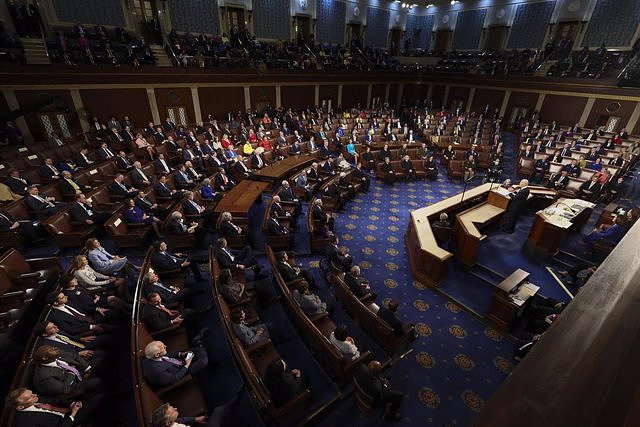MADRID, 2 Ene. (EUROPA PRESS) -
The United States House of Representatives will elect its new president on Tuesday, thus beginning a new parliamentary legislature, the 118th Congress, which will last until January 3, 2025, when Joe Biden will live his last days as president of the country in in the event that he does not revalidate the position in the November 2024 elections.
The position of speaker of the House of Representatives is one of the most prominent in American politics, not only because of its representative figure at the international level -as could be seen in the trip of the outgoing head of the Lower House, Nancy Pelosi, to Taiwan--, but also because of its high position in the national hierarchy.
Under the US Constitution and the Presidential Succession Act of 1947, the Speaker of the House of Representatives is second in the line of presidential succession -- behind only the Vice President, in this case Kamala Harris -- if of the president in office becoming incapacitated, dying, resigning or being removed after an 'impeachment'.
'Number three' in the line of succession is occupied by the 'pro tempore' president of the Senate, followed by the Secretary of State, the Secretary of the Treasury, the Secretary of Defense, the Attorney General and other members of the Administration, being the Secretary of Homeland Security last on the pecking order.
The figure of the speaker of the House of Representatives can also be named as 'designated successor', a role performed by a member of the presidential line of succession and that, in the event that the tenant of the White House and his Cabinet meet in the same physical space, he offers to move to a remote, safe and confidential place.
Normally the State of the Union address and presidential inaugurations are the main events for which a 'designated successor' is named. With this mechanism, the United States ensures that, in the event of a major disaster, there is a member of the line of succession who can take the reins of the country.
However, since 1981 there are no records of any Speaker of the House of Representatives having been named as 'designated successor', with individuals lower in the line of succession more commonly entrusted to this role.
The US lower house therefore elects this Tuesday a not inconsiderable figure for its administrative and political structure, both in internal and external affairs. The outgoing president Pelosi has been a clear example of this by highlighting her figure in both fields.
On the national scene, Pelosi has been one of the first political figures to demand a parliamentary investigation to clarify what happened on January 6, 2021, when a mob of supporters of former US President Donald Trump tried to break into the Capitol to stop the ratification of votes in favor of elected Joe Biden.
On that ignominious day for American democracy, Pelosi and the leader of the Democratic majority in the Senate, Chuck Schumer, tried to stop the assault from within and, for almost four tense hours, warned of the danger that this situation entailed for security. staff of officers and employees of the building.
Internationally, the figure of the speaker of the House of Representatives is respected wherever he goes, although it is true that he can be sent to controversial destinations that the tenant of the White House prefers not to venture to. An example of this may be Pelosi's controversial visit to Taiwan in September 2022, although in this case the Government distanced itself from the trip.
The House of Representatives, currently made up of 222 Republicans, 212 Democrats, and one vacant seat. The Republicans regained control of the lower house after the mid-term elections on November 8, in which, however, they did not win control of the Senate despite the polls that showed it to be so.

 Exploring Cardano: Inner Workings and Advantages of this Cryptocurrency
Exploring Cardano: Inner Workings and Advantages of this Cryptocurrency Seville.- Economy.- Innova.- STSA inaugurates its new painting and sealing hangar in San Pablo, for 18 million
Seville.- Economy.- Innova.- STSA inaugurates its new painting and sealing hangar in San Pablo, for 18 million Innova.- More than 300 volunteers join the Andalucía Compromiso Digital network in one month to facilitate access to ICT
Innova.- More than 300 volunteers join the Andalucía Compromiso Digital network in one month to facilitate access to ICT Innova.-AMP.- Ayesa acquires 51% of Sadiel, which will create new technological engineering products and expand markets
Innova.-AMP.- Ayesa acquires 51% of Sadiel, which will create new technological engineering products and expand markets The European Parliament supports the new fiscal rules adapted to the situation by country
The European Parliament supports the new fiscal rules adapted to the situation by country Agreement between the Government and Navarra to protect traffic competition in the community after the annulment of the Supreme Court
Agreement between the Government and Navarra to protect traffic competition in the community after the annulment of the Supreme Court Ayuso's partner proposed to the Prosecutor's Office to accept 8 months in prison and pay more than half a million euros to avoid trial
Ayuso's partner proposed to the Prosecutor's Office to accept 8 months in prison and pay more than half a million euros to avoid trial Enerside closes the sale to Chint of a 400 MW photovoltaic and storage project in Italy
Enerside closes the sale to Chint of a 400 MW photovoltaic and storage project in Italy How Blockchain in being used to shape the future
How Blockchain in being used to shape the future Not just BTC and ETH: Here Are Some More Interesting Coins Worth Focusing on
Not just BTC and ETH: Here Are Some More Interesting Coins Worth Focusing on Looking for video games that value the neighborhoods of Valencia
Looking for video games that value the neighborhoods of Valencia UPV researchers improve the efficiency of air conditioning systems using a geothermal heat pump
UPV researchers improve the efficiency of air conditioning systems using a geothermal heat pump València is committed to citiverse and smart tourism to be "the reference technological hub of the Mediterranean"
València is committed to citiverse and smart tourism to be "the reference technological hub of the Mediterranean" Valencia displays its "innovative and technological potential" at the Emerge Americas event in Miami
Valencia displays its "innovative and technological potential" at the Emerge Americas event in Miami A million people demonstrate in France against Macron's pension reform
A million people demonstrate in France against Macron's pension reform Russia launches several missiles against "critical infrastructure" in the city of Zaporizhia
Russia launches several missiles against "critical infrastructure" in the city of Zaporizhia A "procession" remembers the dead of the Calabria shipwreck as bodies continue to wash up on the shore
A "procession" remembers the dead of the Calabria shipwreck as bodies continue to wash up on the shore Prison sentences handed down for three prominent Hong Kong pro-democracy activists
Prison sentences handed down for three prominent Hong Kong pro-democracy activists ETH continues to leave trading platforms, Ethereum balance on exchanges lowest in 3 years
ETH continues to leave trading platforms, Ethereum balance on exchanges lowest in 3 years Investors invest $450 million in Consensys, Ethereum incubator now valued at $7 billion
Investors invest $450 million in Consensys, Ethereum incubator now valued at $7 billion Alchemy Integrates Ethereum L2 Product Starknet to Enhance Web3 Scalability at a Price 100x Lower Than L1 Fees
Alchemy Integrates Ethereum L2 Product Starknet to Enhance Web3 Scalability at a Price 100x Lower Than L1 Fees Mining Report: Bitcoin's Electricity Consumption Declines by 25% in Q1 2022
Mining Report: Bitcoin's Electricity Consumption Declines by 25% in Q1 2022 Oil-to-Bitcoin Mining Firm Crusoe Energy Systems Raised $505 Million
Oil-to-Bitcoin Mining Firm Crusoe Energy Systems Raised $505 Million Microbt reveals the latest Bitcoin mining rigs -- Machines produce up to 126 TH/s with custom 5nm chip design
Microbt reveals the latest Bitcoin mining rigs -- Machines produce up to 126 TH/s with custom 5nm chip design Bitcoin's Mining Difficulty Hits a Lifetime High, With More Than 90% of BTC Supply Issued
Bitcoin's Mining Difficulty Hits a Lifetime High, With More Than 90% of BTC Supply Issued The Biggest Movers are Near, EOS, and RUNE during Friday's Selloff
The Biggest Movers are Near, EOS, and RUNE during Friday's Selloff Global Markets Spooked by a Hawkish Fed and Covid, Stocks and Crypto Gain After Musk Buys Twitter
Global Markets Spooked by a Hawkish Fed and Covid, Stocks and Crypto Gain After Musk Buys Twitter Bitso to offset carbon emissions from the Trading Platform's ERC20, ETH, and BTC Transactions
Bitso to offset carbon emissions from the Trading Platform's ERC20, ETH, and BTC Transactions Draftkings Announces 2022 College Hoops NFT Selection for March Madness
Draftkings Announces 2022 College Hoops NFT Selection for March Madness























